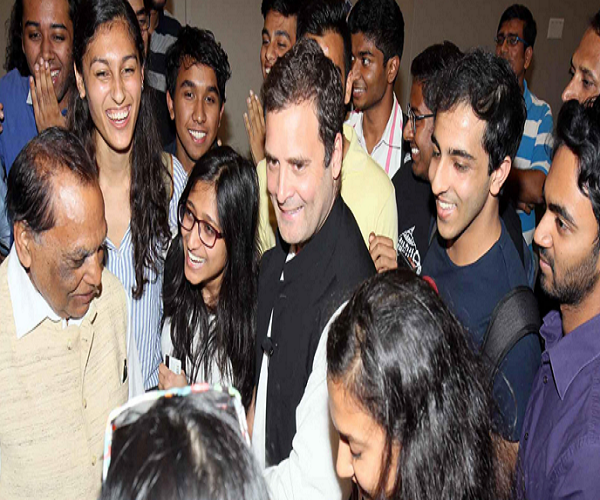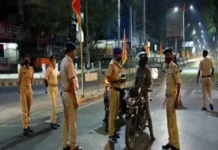’Change takes time’ but for Rahul Gandhi it has happened. A sober yet visibly happy Rahul Gandhi took the mike to address the press yesterday, as the Congress — under his leadership — recorded its most decisive victory in recent polls, all set to form the government in three key states, Madhya Pradesh, Rajasthan and Chhattisgarh.
“This is the victory of the Congress worker, who has in difficult circumstances, stood up and fought for our ideology. I am very proud of him, and her,” Rahul Gandhi said. The media address focused on the youth and farmers, joblessness and agrarian distress. There was no mudslinging, no name calling, no smug chest thumping … Just a sober acceptance of a victory, and an acknowledgment of the hard work and challenges ahead.
Video clips of RG’s media address were all over my social media feed – on Facebook, Twitter, shared in Whatsapp groups, and even on Instagram. “I don’t know how I feel about Rahul Gandhi leading the country,” said one Facebook friend (acquaintance?), “but this speech is an indication of his emergence as a leader.”
“The results of the assembly elections indicate the gradual acceptance of Rahul Gandhi as a leader,” offered another Facebook acquaintance. “I like how Rahul Gandhi is being humble as well as addressing the farmers issue in the press conference. No mud slinging,” said my colleague Ribhu, as he shared a clip of Ravish Kumar’s prime time show from last night in our #KhabarLive Facebook Group.
Twitter — the most vitriol heavy of all social media — was largely positive too. “Rahul Gandhi victory speech was one of the most humble speeches after a long time and didn’t seem orchestrated,” read one comment. “In contrast despite endless jibe and personal attacks by opposition, @RahulGandhi remained focussed, talked about issues and stayed humble, grounded and graceful, which forced people to acknowledge him,” read another.
Media headlines echoed some of what I was seeing on social media. “Rahul Gandhi Sheds ‘Pappu’ Tag, Ready for a Presidential-Style Face-off With Nemesis NaMo,” read one very dramatic headline.
The emergence of Rahul Gandhi … on social media and in newspaper headlines. The same social media and newspaper headlines that had convinced us to dismiss the same Rahul Gandhi till just a few months ago … spinning a narrative that focused on his lack of political acumen and his privileged upbringing, neatly packaged in the ‘pappu’ tag attached to him.
But now that the media is saying that he’s shedding his ‘pappu’ tag, he must be… right?
The media discourse on Rahul Gandhi peddles the narrative of a dumb, privileged political noob transforming into a worthy political leader – with the assembly election results in Madhya Pradesh, Rajasthan and Chhattisgarh being the cocoon for his metamorphosis.
But enough with the media narrative, or any political narrative. As I too am guilty of buying into it. Sometime in 2013, while I was working as a research associate in education, a senior colleague invited me to a close door round table with Rahul Gandhi. “It’s to discuss what problems you see in the education sector,” my senior colleague explained, adding that five to eight people from within the world of education were invited. I jumped at the opportunity, but made sure to include the caveat that it would probably be pointless. “You might be surprised,” was what my colleague left it at.
We went around the table of senior educationists — each pointing out a weighty matter concerning education and the country’s youth. When it came to my turn (I was one of two young – unaccomplished? – people at the table), I was well prepared. I had little to say about education, as I had all of one year’s experience in the field, but I had a lot to say as a young, opinionated Indian.
I told Rahul Gandhi that as a young Indian, I don’t know what alternative the Congress can provide. It seems to never take the BJP head on, instead toeing a safe and cautious line. I don’t know what ideology the Congress stands for anymore, I said. (I also added a little bit about the crumbling organisation — “Where’s the Mahila Congress? Where’s the Youth Congress?” , the disenchanted cadre, the lack of local leadership. Points offered by my parents in a bid to make me seem like I knew what I was talking about).
Rahul Gandhi listened, and spent maybe 20 minutes addressing most of the points that I had raised, and concluding on the lines that he was working on changing things, but “change takes time.”
I quickly forgot about that meeting, as the very idealistic world of education drew me back in. But every time I heard someone refer to Rahul Gandhi as ‘pappu,’ I’d interject with anecdotes of my one, brief meeting. “Actually, he’s very politically sound… (and so on).”
A year later, I found myself in journalism, working with this publication. The ‘pappu’ narrative then extended from my drawing room to my work place, most notably on my reporting assignments.
The first election I covered was the Bihar assembly elections of 2015. The ‘pappu’ narrative was well pronounced, even as the Congress was virtually a non player as its allies in the Mahagathbandhan took on the BJP. The little that was said on the Congress politician was dismissive and belittling, with voters making it clear that the Congress was piggybacking on the JD(U) and RJD.
In the UP assembly elections in early 2017, it was the same story. I attended Rahul Gandhi and Priyanka Gandhi’s election rally in home turf Raebareli, and couldn’t help noting how disconnected they seemed from the local people. And while there were still kinder words for the Rahul Gandhi in Amethi and Raebareli, the voter wasn’t as sympathetic in the other parts of the state we covered.
Where the narrative began to turn was in the Gujarat elections in late 2017. Media headlines didn’t acknowledge this shift, but our coverage did, as the voter — for the first time — spoke of Rahul Gandhi as a worthy opposition leader. I remember a young voter in Patel dominated Mehsana going as far as saying, “Pehle Modi ki lehar chali thi, ab Rahul ki lehar hai (earlier there was a Modi wave, now there’s a Rahul wave.)”
An exaggeration, of course, but words of praise for Rahul Gandhi — even from staunch BJP supporters — were the norm and not the exception as we traveled through Gujarat. It was also a different Congress in Gujarat — with buzzing party offices and workers visible in even the sleepiest rural districts.
This narrative, of according Rahul Gandhi a place as a legitimate and worthy political leader, continued through the last election that I covered – Karnataka. Although Siddaramaiah remained the foremost Congress name, voters — irrespective of who they were voting for — spoke of Rahul Gandhi in more or less positive terms.
The five state assembly elections are indicative of the Congress’ standing as a worthy political opposition in 2019 — as long as it the party changes tack and makes bold to project an agenda, instead of relying almost entirely on the anti-incumbency factor.
I didn’t cover these elections as a reporter, but my social media feed is indicative of Rahul Gandhi’s acceptance as a leader amongst a very interesting subset of the vote base — the young, urban, middle class voter.
But on the ground, Rahul Gandhi had already secured his place as a viable leader. It’s taken the media — and as a result, the urban young person on my social media feeds — a couple of additional elections to catch on.
While scrolling through my social media feeds this morning, I was reminded of that one, brief meeting with Rahul Gandhi, and the promise implicit in the statement, “change takes time.” #KhabarLive







